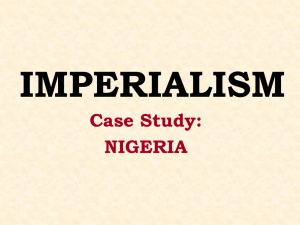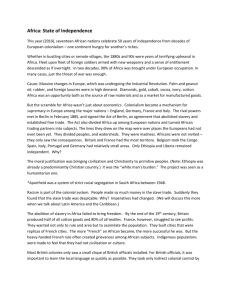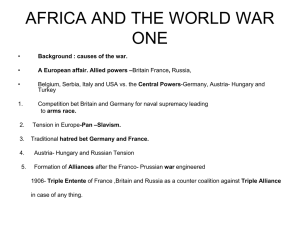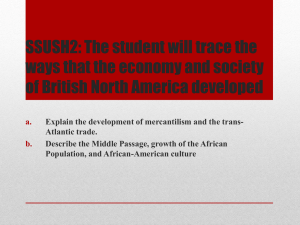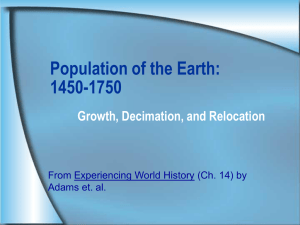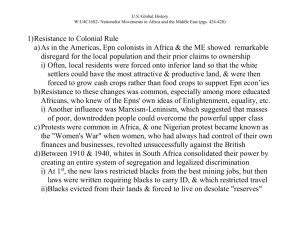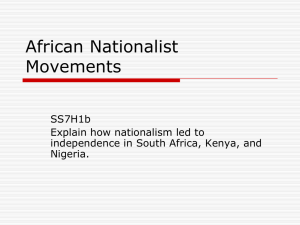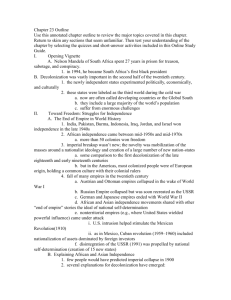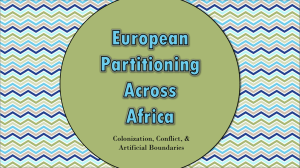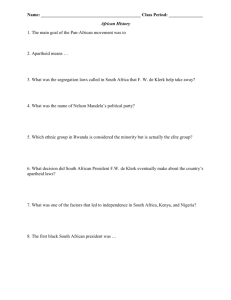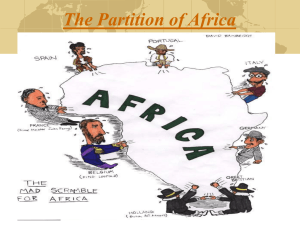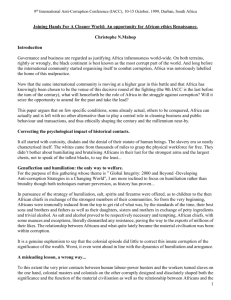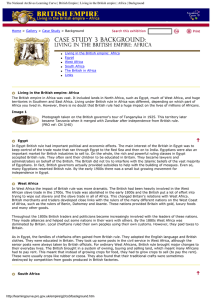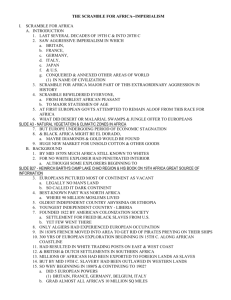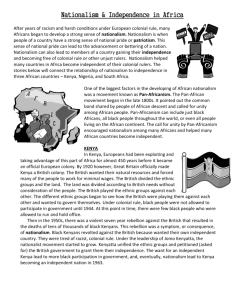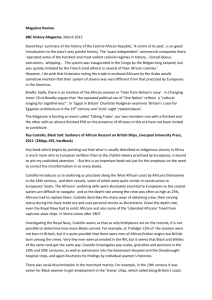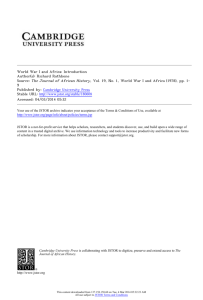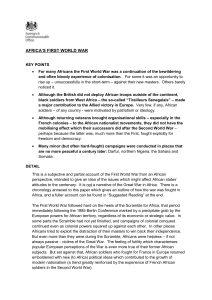Africa 1.4 - RUWorldHistory
advertisement
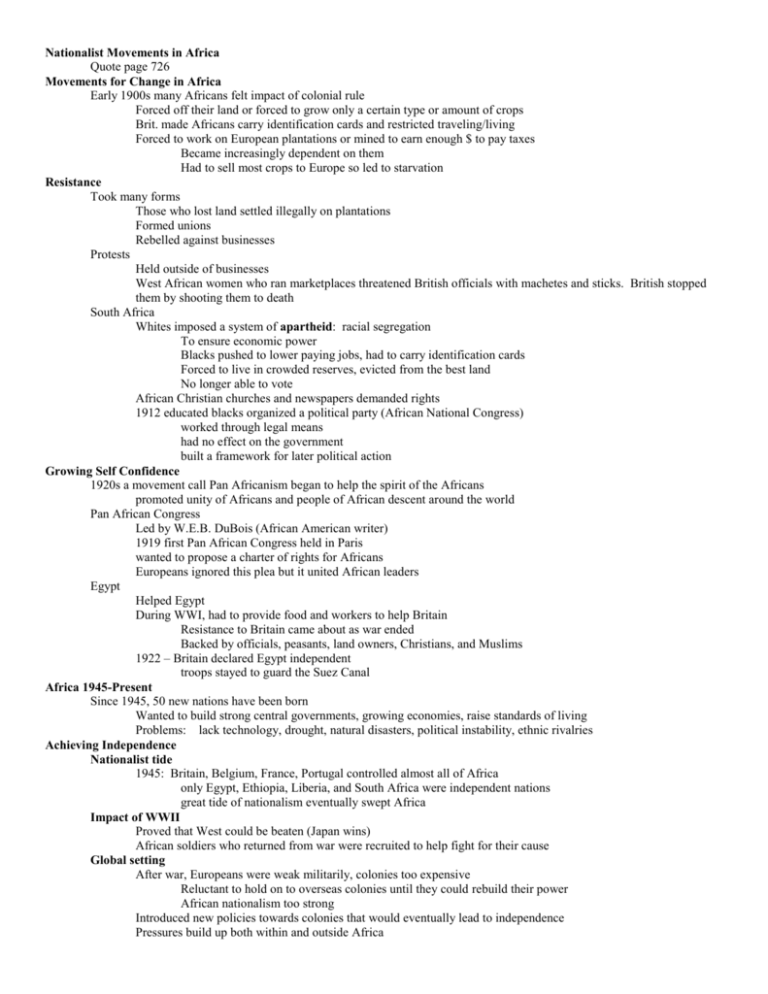
Nationalist Movements in Africa Quote page 726 Movements for Change in Africa Early 1900s many Africans felt impact of colonial rule Forced off their land or forced to grow only a certain type or amount of crops Brit. made Africans carry identification cards and restricted traveling/living Forced to work on European plantations or mined to earn enough $ to pay taxes Became increasingly dependent on them Had to sell most crops to Europe so led to starvation Resistance Took many forms Those who lost land settled illegally on plantations Formed unions Rebelled against businesses Protests Held outside of businesses West African women who ran marketplaces threatened British officials with machetes and sticks. British stopped them by shooting them to death South Africa Whites imposed a system of apartheid: racial segregation To ensure economic power Blacks pushed to lower paying jobs, had to carry identification cards Forced to live in crowded reserves, evicted from the best land No longer able to vote African Christian churches and newspapers demanded rights 1912 educated blacks organized a political party (African National Congress) worked through legal means had no effect on the government built a framework for later political action Growing Self Confidence 1920s a movement call Pan Africanism began to help the spirit of the Africans promoted unity of Africans and people of African descent around the world Pan African Congress Led by W.E.B. DuBois (African American writer) 1919 first Pan African Congress held in Paris wanted to propose a charter of rights for Africans Europeans ignored this plea but it united African leaders Egypt Helped Egypt During WWI, had to provide food and workers to help Britain Resistance to Britain came about as war ended Backed by officials, peasants, land owners, Christians, and Muslims 1922 – Britain declared Egypt independent troops stayed to guard the Suez Canal Africa 1945-Present Since 1945, 50 new nations have been born Wanted to build strong central governments, growing economies, raise standards of living Problems: lack technology, drought, natural disasters, political instability, ethnic rivalries Achieving Independence Nationalist tide 1945: Britain, Belgium, France, Portugal controlled almost all of Africa only Egypt, Ethiopia, Liberia, and South Africa were independent nations great tide of nationalism eventually swept Africa Impact of WWII Proved that West could be beaten (Japan wins) African soldiers who returned from war were recruited to help fight for their cause Global setting After war, Europeans were weak militarily, colonies too expensive Reluctant to hold on to overseas colonies until they could rebuild their power African nationalism too strong Introduced new policies towards colonies that would eventually lead to independence Pressures build up both within and outside Africa After India won independence from Britain in 1947, all of Africa wanted their freedom Colonial Powers British – grant independence first (Ghana, 1957) Political moves: Development acts pre independence to help transition French – move ahead with all colonies except Algeria Algerian conflict (1954-1962) more choices for other French colonies Increase financial aid Belgium – surprise you’re free, then quick exit No preparation Portugal – resistance, violence until 1974-75 Government (Portuguese) overthrown Routes to Freedom All had own stories and leaders Kenya British rule Indirect rule: some natives allowed in government Mau- Mau – nationalist movement Nairobi highlands – prime farmland “white highlands” – whites own it all “reserves” – reservations for blacks Early 1940s Violent rural action – blacks want access to the farmland Fires mostly Late 1940s Secret ceremonies Aims Immediate – farmland Long term – political freedom – education, voting rights 1952 – attacks, arrests, and troops results: concentration camps – keep the innocent blacks there till trouble is over loyalists – Kenyans loyal to British, sent out against Mau-Maus 1955 – defeat but… settlers – blamed for start of war Jomo Kenyatta, leader of Mau-Mau, 1961 Supported non violent methods to end suppression However, guerilla warfare erupted when non violence no longer worked Burned farms, destroyed livestock, attacked settlers Arrested leader, but makes him a national hero to the people Kenyatta becomes first president of Kenya 1963 – Kenya becomes independent ’61 – ’63 training period for Kenya by British for independence Algeria French rule Direct rule – no natives allowed in government White settlement, very European lifestyle, most Catholic May, 1945 – “Day of Awakening” Algerians celebrations on the defeat of Hitler French go out and gun down over 4,000 people (paranoia) Reforms v. War French want reform/ Algerians want the French out Front de Lib`eration Nationale (FLN) – nationalist party Hide and train until 1954 November, 1954 French just lost to Vietnamese, very weak FLN located in mountains, begins attacks August, 1955 Attacks on cities Turned to guerilla warfare 1958: casualties (huge amounts), disunity (French people are tired of war), and recruits (Algerians get lots) 1962 Independence Results: Anti French No government experience High Expectations, Dashed Hopes Over 50 new nations with great hopes Looked for political and economic development Many had civil wars, natural disasters, military rule, and corrupt dictators Standard of living fell, and majority live in poverty Political “Ideologies” National identity (change names) Afro-Marxism – communism Democracy Outside influences Britain – Commonwealth of Nations – everyone work together to benefit everyone France – (post 1961) – cooperative agreements (largest aid donor to Africa) Former USSR – early quest for influence, sale of arms and military assistance (payment) Afro-Marxist regimes (not Marxist enough) Not enough aid sent Racial discrimination United States – early anti colonists, vs. USSR for influence, access to minerals, open supply lines for oil, trouble spot intervention: intervene with civil war, aid, etc. Colonial Heritage Economic changes Colonial rulers introduced new crops, technology, and cash economies Built roads, cities, railroads, harbors Wanted to link plantations and mines with ships Exported goods and minerals on roads to help pay for expensive projects (RR) Political changes Even when the Europeans left, they dictated how to govern and what law Saw Africans as children who needed guidance Africans expected to rule in democratic ways Education and Health care Provided by missionaries, not by leaders or government Only elementary schools, not many secondary schools
